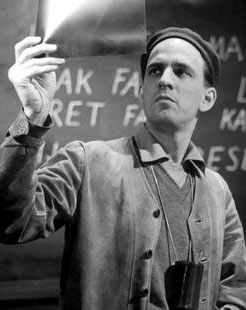Ingmar Bergman (1918-2007)
Ingmar Bergman was a pre-eminent Swedish film director, theater director, screenwriter, and author. Internationally acclaimed as a cinematic auteur, he was known for his exquisite aesthetics and a focus on intense psychological drama, gender issues, theology, philosophy, and autobiography. He worked with a select group of actors and technicians, creating a highly recognizable imprint. His inspirations include the Swedish author August Strindberg and the silent-era filmmaker Victor Sjöström.

The Swedish film director Ingmar Bergman, born in Uppsala in 1918, is perhaps Sweden’s most prominent contemporary cultural figure. Internationally celebrated as one of the world’s greatest filmmakers, he directed more than 40 films and staged many more plays. He also authored a number of novels and autobiographical texts.
Bergman began his career as a stage director, and the corps of actors he assembled at this time would, through repeated collaboration, define his style and career. It included Bibi Andersson, Harriet Andersson, Max von Sydow, and Erland Josephson, all of whom achieved fame through Bergman’s productions. The use of a consistent troupe of actors and the following defined Bergman’s film aesthetic:
- the attention to intense psychological drama;
- a concern with theological issues;
- searching close-ups of the human face;
- confrontation with the darkest side of human nature; and,
- a particular focus on sexuality and gender.
Drawing on his personal background as the son of a Lutheran priest, the cultural inheritance of August Strindberg, the cinematic artistry of such forerunners as Victor Sjöström and Carl Dreyer, and the technical skill of brilliant cinematographers such as Gunnar Fischer and Sven Nykvist, Bergman crafted emotionally and intellectually compelling films that were also often visually stunning. Bergman continued to make black-and-white films well into the 1960s, relying on the outstanding photographic and lighting techniques of his crew to produce such memorable images as a knight playing chess with Death (Det sjunde inseglet/The Seventh Seal, 1957) or the merging of two women’s faces in Persona (1967). His successes in colour film include the vivid red, black, and white palette of Viskningar och rop (Cries and Whispers, 1968) and the exhilarating rainbow hues of Fanny and Alexander (1982). Bergman’s cinematographer Sven Nykvist was awarded the Academy Award for Best Cinematography for those films.
First among his international successes was the light-hearted Sommarnattens leende (Smiles of a Summer Night, 1955), which was awarded a prize at Cannes. Smiles was preceded by 15 films, including acclaimed works as Sommaren med Monika (Monika, 1953) and Gycklarnas afton (Sawdust and Tinsel, 1953). These works earned Bergman the admiration of the French New Wave filmmakers, including François Truffaut and Jean Luc Godard, whose esteem led Bergman to be regarded as one of the leaders among the pantheon of cinematic auteurs.
Outstanding among Bergman’s subsequent films are the theological meditation on the Black Plague, Det sjunde inseglet (The Seventh Seal, 1957) and one man’s surrealistic and transformative journey into his own past, Smultronstället (Wild Strawberries, 1957).
Bergman’s next series of successes is sometimes called the ‘God trilogy’ for its focus on spiritual (but also sexual) issues; the most provocative of these is Tystnaden (The Silence, 1963). Then came the complex and daringly experimental Persona (1966), which combines an analysis of the nature of cinematic art with a deep investigation of the construction of the individual psyche. Liv Ullmann had her Bergman debut in Persona and went on to become the filmmaker’s lover and most important actress during his psychological period of the late 1960s and 70s, of which Viskningar och rop (Cries and Whispers, 1972) constitutes the apex.
At the age of 86 Bergman completed his last film, Saraband (2004). He then withdrew to his retreat on the island of Fårö, where he died in 2007.
Further reading:
- B. Steene, Ingmar Bergman: A Guide to References and Resources (Boston, Mass.: G.K. Hall, 1987)